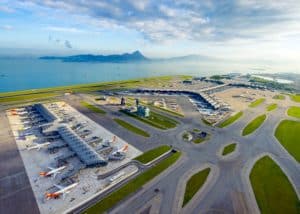In this article, I want to talk about what ordinary citizens of Hong Kong can do about their legal status and what options they have regarding their wealth.
If you want to discuss second residency and other options, you can contact me on advice@adamfayed.com
The political situation in Hong Kong is changing on a daily basis and it sometimes seems as though there are hourly changes to keep up with.
To be fair, I’m not going to discuss exactly where we might be in a year’s time – or even a month or two from now – because no one can truly say what might happen.
That said, Beijing has made it fairly clear to Hong Kong’s citizens – and the rest of the world, for that matter – that it will not put up with any political ‘interference’ from the West and the UK in particular.
Of course, there are historic reasons for that. However, the deal the UK brokered with the People’s Republic of China in the late 1990s does look like it is under considerable strain.
When the British first occupied Hong Kong island in 1841, few would have predicted that it would remain in their hands for over 150 years. On the other hand, many people did think that the 50-year deal signed in 1997 – supposedly to guarantee freedoms for Hong Kong – would stay the course.
We are only 23 years into that arrangement – one that, in fairness, has served the economic interests of China very well. If new laws come into force in Hong Kong, then there could be significant economic turmoil to say the least.
That’s why I keep getting asked about what options there are for Hong Kong’s residents. Read on to find out more about what you can do to protect yourself in an ever-changing world.
Firstly, I’ll look at what Hongkongers can do if they want to leave the city. In the second part of this article, we’ll look into diversifying wealth so that it is safeguarded as much as possible.
BNO status and moving to the UK
British Nationality (Overseas), or BNO, is a type of UK citizenship that came into force specifically to cover people who were residents of Hong Kong prior to the changeover in 1997.
In the region of 3 million Hongkongers acquired this status at this time. Chinese nationals living in Hong Kong at the time and who moved there subsequently, however, are highly unlikely to have been granted BNO status.
Anyone with BNO status has always been able to maintain what the UK government calls a ‘pathway’ to full citizenship.
In July, the Foreign Secretary, Dominic Raab, announced in the House of Commons that a ‘bespoke’ package would be put together by the UK government for anyone with BNO status.
Importantly, the move would come into force with the dependents of people with BNO status, too.
Mr Raab said that BNO people would have five years leave to remain in the UK if they wished to take up the offer. This includes the right to work or study in Britain.

Settled status in the UK can be applied for by all those covered under the scheme after those five years are up.
After another year has passed, anyone with settled status would then be allowed to make an application for full UK citizenship.
Although there are similar pathways for UK citizenship for people from other parts of the world, this is a unique arrangement for people with BNO status which the Foreign Secretary said were being put in place ‘in light of our historic commitment’ to the people of Hong Kong.
Anyone who wants to take advantage of the UK government’s offer will need a BNO passport. At the start of the year, only about a third of a million people held them.
Therefore, my advice is that even if you have no plans to leave Hong Kong for now, applying for a BNO passport is a good idea. You never know when you might want to avail of one.
Moving to the UK without BNO status
Anyone without BNO status who is thinking about making Britain their home will also be well advised to consider how they can gain visa entry to the country.
People who are working in their own start-up or tech companies may well be welcomed by the British authorities, for example. There are two visas worth looking into, the start-up visa and the innovator visa.
So-called Tier 1 investor and entrepreneur visas are also offered by the UK government. If you are granted indefinite leave to remain with either of these visas, then you will not be allowed to spend more than 180 days outside the UK in any given year, however.
Tier 1 visas offer an advantage over other types because you can obtain an accelerated route to settled status after just two or three years, not the five years that is mentioned in the BNO scheme.
Since many people will potentially qualify for the Tier 1 investor route, it is worth mentioning what you need.
Firstly, you must have at least £2 million to invest in the UK immediately. Such investments must be made in certain ways, however.
Qualifying investments under Tier 1 investment visa included UK government bonds, share or loan capital in UK-registered businesses or pooled investment vehicles which are government-approved.
Importantly, Tier 1 investor visas offer settled status applications at different times according to how much you have to invest.
As mentioned, the minimum threshold is £2 million which means you can apply for indefinite leave to remain after five years.
Invest £5 million or more in the UK and you can apply in three years time. If you have £10 million, the corresponding period is just two years.
Of course, there is a lot more detail when it comes to UK citizenship and visa applications, much of which will relate to personal circumstances. You can always contact me for more tailored advice.
I also appreciate that many Hong Kong residents will be looking at Singapore, Australia and the United States as potential places to move, as opposed to the UK, if they decide to leave.

Indeed, the Taiwanese President, Tsai Ing-wen, has also gone on the record to say that she will make it as easy as possible for Hongkongers to relocate there. A working committee of her cabinet was established in May to work out a system but the details are still sketchy.
That said, over 5,500 people left Hong Kong for Taiwan last year, many more than did so in 2018 and it is certainly a trend that looks like it is going to remain.
Money advice for Hong Kong’s residents
The extradition bill has been at the heart of the student protests in Hong Kong this year. This legal move will cover all of Hong Kong’s residents – both foreigners and Chinese nationals – who live and work in the city.
As such, it is not just an issue for the youth of the Hong Kong. Indeed, many see it as a means of undermining the rule of law that underpins the very international financial reputation of the city itself.
In other words, if confidence in Hong Kong as a place to do business and to register companies slides, then capital flight may start to become the norm.
I’ve already come across some individuals moving sums as large as the $100 million mark from a local Citibank account in Hong Kong to another one in Singapore.
Of course, offshoring wealth is not necessarily something that Hong Kong’s residents might want to do immediately. In a changeable situation, it is likely to be beneficial to everyone living in the city to have immediate access to a proportion of their funds, at least.
However, moving liquid assets out of the city may not be as easy in the future. So, what should you be doing?
Overall, I would recommend hedging for a number of different scenarios. Many people are now planning for their future lives either in another part of the world or in a much-altered Hong Kong.
I would advise everyone living and working in Hong Kong today to consider what their future needs might be and to plan their finances accordingly. In fact, this is always good monetary advice but it is especially pertinent given the current geopolitical situation.
A spokesperson for the government of Hong Kong recently said something that I found quite telling.
When asked for a comment about the number of wealthy individuals moving their money out of Hong Kong to places like Singapore, the government said that the ‘world-class financial infrastructure’ of the city was beyond doubt.
The spokesperson went on to add that the open financial system in the city enjoyed a regulatory regime that was ‘completely compatible with those found in overseas markets’.
So, what is going on? Far from the Hong Kong government being concerned over capital flight, it appears to be saying that it is ‘business as usual’.
After all, nothing would hasten capital out of the city than rumours of restrictions being made on the movement of wealth.
However, it is clearly detectable that the Hong Kong government thinks that its international financial centre will continue to operate in a conventional manner even if these law changes come into force.
In other words, even if the agreement with the UK that supposedly preserves rights in Hong Kong is torn up, Beijing still says it wants Hong Kong to operate as its global financial centre.
Long-term though, Hong Kong will probably lose out to Singapore and become increasingly authoritarian.
Taking wealth out of Hong Kong
I would be cautious about moving all of your assets out of Hong Kong given that the situation is so changeable. If you are planning to move already, then it is another matter, however.
As previously mentioned, you may need advice on which businesses and other investment vehicles to put your money into if you are going to seek a Tier 1 investor visa for the UK.
Similar visas exist elsewhere, of course. I can help you to make the necessary investments to obtain a subclass 891 investor visa for Australia, too, for example.
However, if you are simply looking for a similar business-friendly place to transfer your wealth temporarily, then you have more flexibility.
For instance, Singapore is usually among the top-rated places for banking and finance and the regulatory regime there is very similar to that which you would find in Hong Kong.
There are some double tax avoidance treaties in place in the city-state which are worth looking into, for instance.
In addition, Singapore has some tax incentives that can be taken advantage of if you choose to set up a new business in the city.
However, it is not possible to always move all of your tangible and intangible assets from Hong Kong to a city like Singapore, especially if you are talking about equity holdings or, an even trickier proposition, intellectual property.
A balanced approach
For many people, financial planning will not be about a wholesale movement of assets from Hong Kong to another corner of the globe.
Of course, for some, it really will be a question of deciding how best to plan for a new life in a new country.
However, as the situation currently stands, it is a fair assumption that many Hong Kong residents will continue to have familial and business ties with the city even if they choose to depart.
That’s why financial advice – no matter what you choose to do as Beijing tightens its political control over the city – has to be tailored.
In nearly all cases, there will be no single solution that drives all of your decision-making. It should be like anything else in finance – a measured approach that diversifies risk while prioritising life and business goals.
Working out the best approach for you is at the heart of the service that I provide – that’s something that is true whether you live in Hong Kong or not.
However, given the particular circumstances of what Hong Kong residents are going through right now, there has never been a better time to obtain independent expert advice.
Whether you are seeking some measures that will allow you to move out of the city in due course or you simply want to shift a proportion of your wealth where it will remain safe, I can help.
Do not hesitate to email me to find out more about how I can help you steer your way through potentially choppier waters to come.
Conclusion
It does make sense to have some “insurance” and moving some of your money out of Hong Kong, and having second residencies and citizenships.
That doesn’t mean panicking just yet though, but you should act in a balanced way.
The information in this article is for general guidance only. It does not constitute financial, legal, or tax advice, and is not a recommendation or solicitation to invest. Some facts may have changed since the time of writing.



